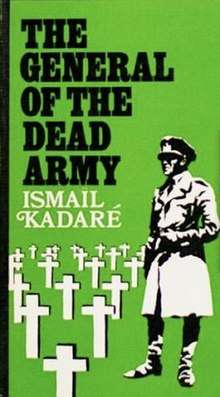The General of the Dead Army (novel)
The General of the Dead Army (Albanian: Gjenerali i ushtrisë së vdekur) is a 1963 novel by the Albanian writer Ismail Kadare. It is the author's most critically acclaimed novel.[1] It is noted that Kadare was encouraged to write the book by Drago Siliqi, literary critic and director of the state-owned publishing house Naim Frashëri.[2]
 First English-language edition | |
| Author | Ismail Kadare |
|---|---|
| Original title | Gjenerali i Ushtrisë së vdekur |
| Translator | Derek Coltman |
| Country | Albania |
| Language | Albanian |
| Genre | History |
| Publisher | Sh.B. Naim Frashëri W. H. Allen |
Publication date | 1963 |
Published in English | 1971 |
| Pages | 264 |
| ISBN | 9780099518266 |
The English translation by Derek Coltman, first published by W. H. Allen, was made not directly from the Albanian, but from the 1970 French edition published by Albin Michel. A revised English edition was published by The Harvill Press in 2000, in light of the revised French edition published by Fayard in 1998, and was reprinted by Vintage Press in 2008.
Plot
In the early 1960s, nearly 20 years after the end of the Second World War, an Italian general, accompanied by a priest who is also an Italian army colonel, is sent to Albania to locate and collect the bones of his countrymen who had died during the war and return them for burial in Italy. As they organise digs and disinterment, they wonder at the scale of their task. The general talks to the priest about the futility of war and the meaninglessness of the enterprise. As they go deeper into the Albanian countryside they find they are being followed by another general who is looking for the bodies of German soldiers killed in World War II. Like his Italian counterpart, the German struggles with a thankless job looking for remains to take back home for burial, and questions the value of such gestures of national pride.
Reception
The novel has received many positive reviews. Richard Eder of The New York Times stated that "Kadare advances wryly and dryly into the darkness...[he] doesn't do messages; he brings them to lethal life".[3] The Boston Globe called it "a powerful and poignant Albanian novel". Alan Brownjohn of The Times Literary Supplement praised the novel by calling it "a profoundly moving novel...rich in poignant details".[4]
It was listed on Le Monde's 100 Books of the Century.
Translations
It was first translated in Bulgarian by Marina Marinova,[5] published in 1966.[6] After that, it was translated in Serbo-Croatian by Esad Mekuli and published in 1968.[7] Then it was translated in Turkish by Attila Tokatlı and Necdet Sander and published in 1970 from Sander editions in Istanbul.[8]
Adaptations
Films
- The General of the Dead Army (Italian: Il generale dell'armata morta) is a 1983 Italian film, based on the novel, directed by Luciano Tovoli.
- The Return of the Dead Army (Albanian: Kthimi i Ushtrise se Vdekur) is a 1989 Albanian film based on the novel directed by Dhimitër Anagnosti.
Theatrical
The book has been adapted for the stage and is a commonly performed play in Albanian theaters and in some neighboring countries.[9]
References
- RICHARD EDER for NY Times, September 30, 2008
- Jorgaqi, Nasho. "Drago, një jetë e shkurtër, një emër jetëgjatë". Shekulli.
- Richard Eder (30 Sep 2008). "Leading a Dark Mission to Albania's Fields of Bones". The New York Times.
- Alan Brownjohn (10 Nov 2000). "Kingdom of Bones". Times Literary Supplement.
- "Shuhet Marinova, përkthyesja e Kadaresë dhe e Migjenit". Panorama. 16 February 2012. Retrieved 29 October 2019.
- Morgan 2011, p. 89.
- "Ismail Kadare, gjysëm shekulli i Gjeneralit të ushtrisë së vdekur". Shqiptarja.com. 1 December 2013. Retrieved 29 October 2019.
- Hasan Anamur (2013). Başlangıçtan Bugüne Fransızcadan Türkçeye Yapılmış Çeviriler ile Fransız Düşünürler, Yazarlar, Sanatçılar Üzerine Türkçe Yayınları İçeren Bir Kaynakça Denemesi. Gündoğan Yayınları. p. 563. ISBN 9789755202358.
- The General of the Dead Army in Skopje, Republic of Macedonia